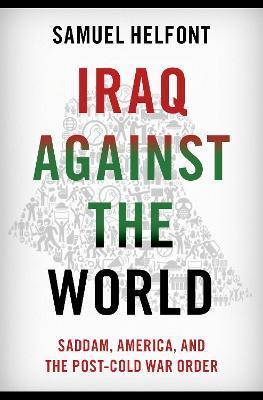Iraq Against the World: Saddam, America, and the Post-Cold War Order

Iraq Against the World: Saddam, America, and the Post-Cold War Order
The move away from post-Cold War unipolarity and the rise of revisionist states like Russia and China pose a rapidly escalating and confounding threat for the liberal international order. In Iraq against the World, Samuel Helfont offers a new narrative of Iraqi foreign policy after the 1991 Gulf War to argue that Saddam Hussein executed a political warfare campaign that facilitated this disturbance to global norms. Following the Gulf War, the UN imposed sanctions and inspections on the Iraqi state--conditions that Saddam Hussein was in no position to challenge militarily or through traditional diplomacy. Hussein did, however, wage an influence campaign designed to break the unity of the UN Security Council. The Iraqis helped to impede emerging norms of international cooperation and prodded potentially revisionist states to act on latent inclinations to undermine a liberal post-Cold War order. Drawing on internal files from the ruling Ba'th Party, Helfont highlights previously unknown Iraqi foreign policy strategies, including the prominent use of influence operations and manipulative statesmanship. He traces Ba'thist operations around the globe--from the streets of New York and Stockholm, to the mosques of Pakistan and Saudi Arabia, to the halls of power in Paris and Moscow. Iraqi Ba'thists carried out espionage, planted stories in the foreign press, established overt and covert relations with various political parties, and attempted to silence anyone who disrupted their preferred political narrative. They presented themselves simply as Iraqis concerned about the suffering of their friends and families in their home country, and, consequently, were able to assemble a loose political coalition that was unknowingly being employed to meet Iraq's strategic goals. This, in turn, divided Western states and weakened norms of cooperation and consensus toward rules-based solutions
to international disputes, causing significant damage to liberal internationalism and the institutions that were supposed to underpin it. A powerful reconsideration of the history of Iraqi foreign policy in the 1990s and the early 2000s, Iraq against the World offers new insights into the evolution of the post-Cold War order.
PRP: 259.10 Lei
Acesta este Prețul Recomandat de Producător. Prețul de vânzare al produsului este afișat mai jos.
233.19Lei
233.19Lei
259.10 LeiLivrare in 2-4 saptamani
Descrierea produsului
The move away from post-Cold War unipolarity and the rise of revisionist states like Russia and China pose a rapidly escalating and confounding threat for the liberal international order. In Iraq against the World, Samuel Helfont offers a new narrative of Iraqi foreign policy after the 1991 Gulf War to argue that Saddam Hussein executed a political warfare campaign that facilitated this disturbance to global norms. Following the Gulf War, the UN imposed sanctions and inspections on the Iraqi state--conditions that Saddam Hussein was in no position to challenge militarily or through traditional diplomacy. Hussein did, however, wage an influence campaign designed to break the unity of the UN Security Council. The Iraqis helped to impede emerging norms of international cooperation and prodded potentially revisionist states to act on latent inclinations to undermine a liberal post-Cold War order. Drawing on internal files from the ruling Ba'th Party, Helfont highlights previously unknown Iraqi foreign policy strategies, including the prominent use of influence operations and manipulative statesmanship. He traces Ba'thist operations around the globe--from the streets of New York and Stockholm, to the mosques of Pakistan and Saudi Arabia, to the halls of power in Paris and Moscow. Iraqi Ba'thists carried out espionage, planted stories in the foreign press, established overt and covert relations with various political parties, and attempted to silence anyone who disrupted their preferred political narrative. They presented themselves simply as Iraqis concerned about the suffering of their friends and families in their home country, and, consequently, were able to assemble a loose political coalition that was unknowingly being employed to meet Iraq's strategic goals. This, in turn, divided Western states and weakened norms of cooperation and consensus toward rules-based solutions
to international disputes, causing significant damage to liberal internationalism and the institutions that were supposed to underpin it. A powerful reconsideration of the history of Iraqi foreign policy in the 1990s and the early 2000s, Iraq against the World offers new insights into the evolution of the post-Cold War order.
Detaliile produsului










